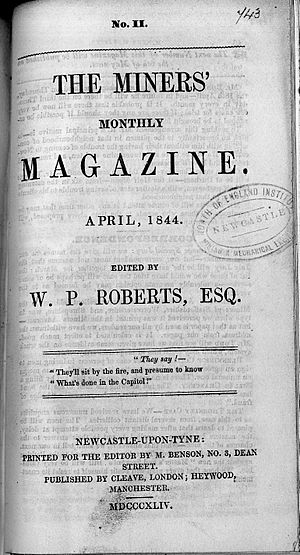William Prowting Roberts facts for kids
William Prowting Roberts (1806–1871) was a famous lawyer who fought for the rights of working people in England. He was a key figure in a movement called Chartism, which aimed to give more power to ordinary people. Roberts became especially well-known as the "attorney-general" (a top lawyer) for coal miners in the 1840s, helping them with their legal problems.
Quick facts for kids
William Prowting Roberts
|
|
|---|---|
| Born | 11 December 1806 Chelmsford, Essex, England, United Kingdom of Great Britain and Ireland
|
| Died | 7 September 1871 Chorleywood, Hertfordshire
|
| Occupation | Solicitor |
Contents
Early Life and Family
William Prowting Roberts was born in Chelmsford, Essex, England. His father, Thomas Roberts, was the head of a local grammar school. His mother was the daughter of William Prowting, a surgeon.
Roberts married Mary Moody and they had two children. After Mary passed away, he later married Mary Hill Hopkins. Together, they had four children.
Fighting for People's Rights
Roberts started his law practice in Bath, Somerset. There, he quickly became involved in local politics. He led the Bath Working Men's Association, a group that worked for the rights of ordinary people.
The Chartist Movement
Roberts joined the Chartist movement, which wanted to change how Britain was governed. Chartists believed that all men should have the right to vote. They also wanted fair elections and other important changes.
Roberts was a great public speaker. He often spoke at meetings in the West Country. He also defended other Chartists in court. In 1840, he was sentenced to prison after a meeting in Devizes, Wiltshire. But he was released early and kept fighting for the Chartist cause. He helped lead the Chartist Co-operative Land Company. Roberts even ran for election to Parliament in 1847 and 1857.
Helping the Miners
Roberts was one of the first lawyers to focus on helping trade unions. These unions were groups of workers who joined together to improve their working conditions.
The Miners' "Attorney-General"
Roberts became the main legal adviser for the Northumberland and Durham Miners' Union. Miners called him their "attorney-general" because he was always there to defend them. His simple rule was: "We resist every individual act of oppression, even in cases we were sure of losing." This meant he would fight for miners no matter how small the injustice.
Roberts challenged unfair work rules called the Bond. This system often tied miners to their jobs with harsh terms. He won many cases against the Bond. For example, he helped free miners from Thornley, Durham who were jailed for breaking these rules.
He also fought against the Truck system. This was when miners were paid with goods instead of money. This often meant they had to buy overpriced items from company stores.
Improving Mine Safety
In 1844, 95 miners died in an explosion at the Haswell colliery. Roberts held an investigation into this terrible accident. His findings helped lead to a government inquiry into mine safety. This was a big step towards making mines safer for workers.
Roberts also edited the Miners' Monthly Magazine for a few months in 1844. He wanted to make it easier for miners to get his legal advice. He also wrote for other union newspapers like the Miners' Advocate.
Moving to Manchester
After a long dispute, the coal owners weakened the miners' union. The union could no longer afford Roberts's services. So, in 1845, Roberts moved to Manchester. There, he became the legal adviser for the Lancashire Miners' Association.
In Manchester, Roberts continued to fight for workers. He helped trade union members who were accused of picketing (protesting outside a workplace). He even assisted Karl Marx with some legal matters. Roberts also spoke out against laws that he felt limited the freedom of poor people.
Later Legal Battles
From 1858 to 1863, Roberts advised the Miners' National Association. However, the union's president, Alexander MacDonald, felt Roberts's methods were old-fashioned. The unions now wanted lawyers who could use the law to settle disagreements, not just to challenge employers.
Fighting the Truck System Again
One of Roberts's important later cases involved Janet Jones of Blaenau. Her father had died, and she was forced to work for two years without pay to clear his debts at a company store (a Tommy Shop). Roberts helped Janet get her wages. This case also started a big campaign against the unfair Truck system.
Defending the Irish
In 1867, Roberts defended some Fenians (Irish nationalists) accused of murder. He was even taken into custody himself during one trial because the judge thought his behavior was disorderly. Later that year, he helped free Ann Justice, who was charged in the Clerkenwell explosion. Roberts worked to fight against unfair treatment of Irish people in England.
His last major case was in 1869. He finally succeeded in getting rid of the Bill system for miners at Monkwearmouth Colliery. In 1871, he wrote a pamphlet warning about the dangers of a new government law, the Trade Union Bill.
Final Years
Roberts dedicated his life to helping the poor. He believed that everyone, especially the poor, should be able to live good lives. He traveled to the Holy Land twice with his wife. They moved to Heronsgate House in 1867. This house was on land that was part of the first Chartist land settlement. William Prowting Roberts passed away there on 7 September 1871 and was buried in Chorleywood churchyard.
 | John T. Biggers |
 | Thomas Blackshear |
 | Mark Bradford |
 | Beverly Buchanan |


